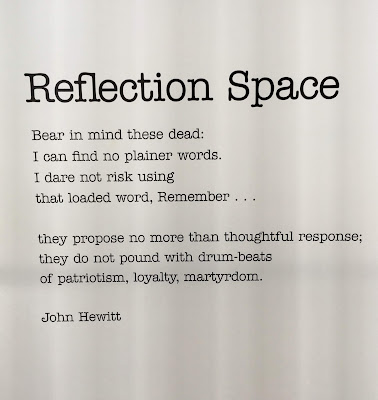Sealed under glass was the original lease for the land signed by Arthur Guinness . . . for 9000 years; now that was a good deal! The tour took us story by story up a glass atrium shaped in the form of a pint glass of Guinness, and included a survey of the four ingredients which make up this well-known beer: water (from the Wicklow Mountains), hops, toasted barley, and yeast which is said to be the original strain developed by Arthur himself.
In the past it was thought that beer like Guinness imparted strength for the working man, and some of the advertisements on display (disputed these days by modern nutritionists) touted that quality.
We left the Guinness Storehouse and continued north to Belfast, Northern Ireland, and as we left Dublin we passed the beautiful Christ Church Cathedral.
Then we crossed the River Liffey again, and in a little over an hour we had left the Republic of Ireland and were in Northern Ireland. This border, for those who have been following the Brexit issue, is not a "hard" one - one barely notices entering another country (our fifth on this tour). But once again we were in the United Kingdom - Pounds and Miles, instead of Euros and Kilometers - and Steve gave us a nutshell history of the very complicated and often violent relationship between the two countries, referred to as "The Troubles." After almost thirty years, the Good Friday Agreement of 1998 brought peace between the two countries, but feelings run deep and the fear is that the Brexit issue, and a "hard border," will bring it to the fore again. One complicating factor, among many, is that there are 205 roads between the two countries, none of which has a gate or sentry.
Some of our travelers had signed up for a tour of the Titanic Museum in Belfast, one of the largest tourist attractions in the city, located next to the Harland & Wolff shipyard where the ill-fated ship had been constructed.
The rest of us were dropped downtown and enjoyed touring the downtown area and in its heart the beautiful City Hall, which looked more like a church than a municipal building.
In a Reflection Space room in the City Hall, I read this beautiful little poem on the wall.
ur next adventure was something that Steve later told us was, he thought, the highlight of the entire tour, which surprised me. It was a drive by authentic Belfast taxicab drivers to see the Peace Walls. Belfast is still demarcated by almost 100 of these walls that separate Catholic and Protestant areas; once serving as peace-keeping measures, they are now, after the Good Friday Agreement, an oft-visited tourist attraction visited by prominent world leaders (such as the Dali Lama and Bill Clinton) and ordinary people seeking to understand.
The cabbies drive the ubiquitous black cabs, seen also in London, and they proved to be informative in a way that an ordinary tour guide would not have been. Down-to-earth, free with the use of expletives, witty and sarcastic, they have seen it all, and they did not mind telling us about it all from their perspective. Four of them spoke in all, some Catholic and some Protestant. The took us first to an area where large commemorative murals had been painted on the walls for the martyrs who had died here.
Then we drove to a section of the Wall itself, as intimidating as anything I had seen. We could take a lesson in this country that others have already learned about the ugliness and futility of such walls.
I took dozens of photos of messages that I found, ultimately, to be messages of great beauty and hope and encouragement. Like these taxicab drivers, I hope that, in the world of one anonymous writer, we can believe that "Where there is love, there is life."
It had been a long day, and we were rewarded to find the coach driving down a tree-lined street that seemed more residential than commercial, the location of our lodging for the night, the lovely Malone Lodge Hotel.



















No comments:
Post a Comment